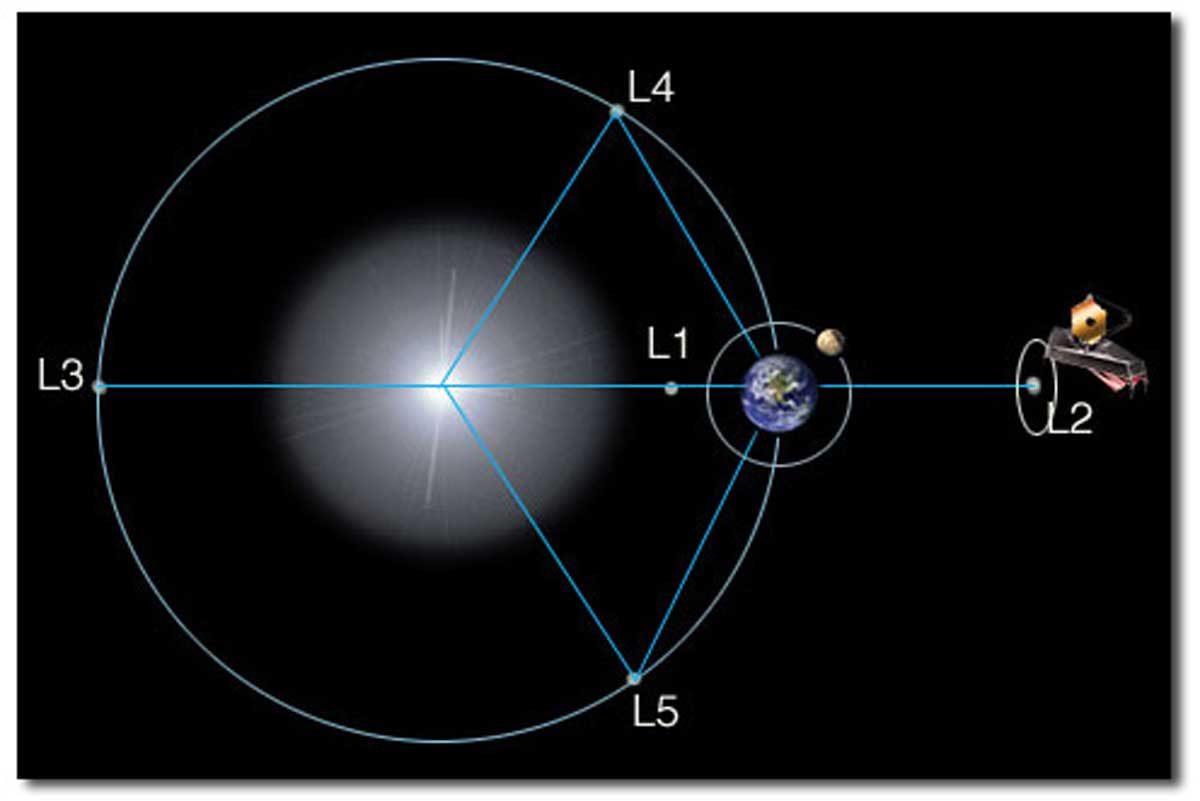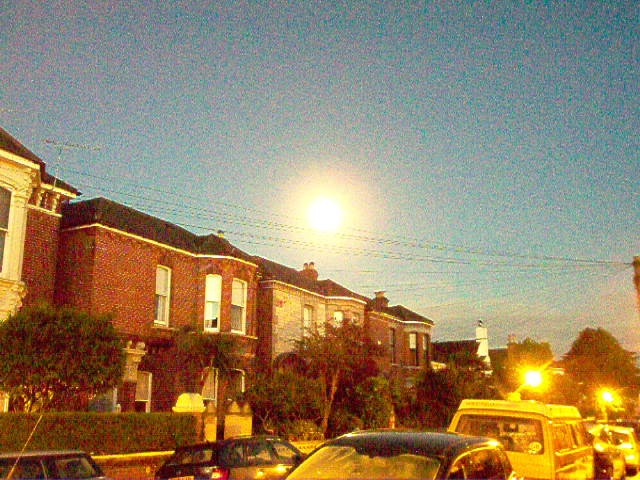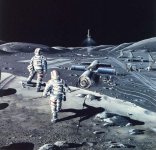Slow down, Nick - I haven't been shortlisted for Astronomy Photographer of the Year 2021! 😀The software I wrote simply uses, and records, the guide star images through the off axis guider. Then it's a scope point spread function for the OTL and then atmosphere point spread function deconvolution. It gives a more nuanced deconvolution than using the stars in the long exposure.
Astronomy Photographer of the Year 2021: Shortlist revealed - BBC News
For the uninitiated out there, deconvolution is a computer process used to improve the telescopic image.
A recent Sky at Night programme demonstrated software for the DSLR user which compensates for atmospheric blurring.
Basically, the camera takes multiple images and the software rejects all the blurred ones while stacking the sharp ones to form the final image.
The above process may be chicken feed compared to your techniques, but at least I can understand it!

I've just read it!Nice article on the JWST here
Why NASA’s James Webb Space Telescope Will Never Live As Long As Hubble
It is new to me that Webb is only designed for a primary 5-year mission, with a hoped for 10-years.
Unlike Hubble which is situated in low-Earth orbit, the Webb will be situated at the L2 Lagrange point which is about four times the distance from the Earth to the Moon away.
Due to its distant location, the Webb will not be serviceable as no planned spacecraft will be able to reach it. This is in contrast to the Hubble which has been accessible to crewed vehicle servicing missions and is still operational after 31+ years.
Last edited:
'Tis a thing of insectoid beauty, that James Webb. The deployment video is astonishing. 😎
Why NASA’s James Webb Space Telescope Will Never Live As Long As Hubble
I think I could have made it look more like a butterfly, and I am curious why it must expend fuel to turn. What's wrong with solar-powered gyroscopes as in Hubble.?

The rather tiny image says it will see 300M years after the Big Bang. Which is right back to the opaque phase IIRC.
I had to look up deconvolution too. But seems familiar in the array of digital signal processing techniques. You can also correct time delay in filters using stuff like that. It always adds noise AFAIK though. You don't get something for nothing.
NickKUK, good images. Good equipment. Were you abroad when you shot the bearclaw? I can never see the tail of Scorpio from the UK.
Why NASA’s James Webb Space Telescope Will Never Live As Long As Hubble
I think I could have made it look more like a butterfly, and I am curious why it must expend fuel to turn. What's wrong with solar-powered gyroscopes as in Hubble.?
The rather tiny image says it will see 300M years after the Big Bang. Which is right back to the opaque phase IIRC.
I had to look up deconvolution too. But seems familiar in the array of digital signal processing techniques. You can also correct time delay in filters using stuff like that. It always adds noise AFAIK though. You don't get something for nothing.
NickKUK, good images. Good equipment. Were you abroad when you shot the bearclaw? I can never see the tail of Scorpio from the UK.
Last edited:
Re the JWST, I’m surprised NASA did not include some ‘grab handles’ on it so at least a robotic device could go out there and haul it back into low Earth orbit for repairs, and then take it out again.
I obviously have no clue about the orbital mechanics required to put something like this into L2, retrieve it and then send it back, but just a thought. I would imagine to bring it back, you’d have to accelerate it up to c. 18 000 MPH
I obviously have no clue about the orbital mechanics required to put something like this into L2, retrieve it and then send it back, but just a thought. I would imagine to bring it back, you’d have to accelerate it up to c. 18 000 MPH
Why can’t the idea of a Big Bang be both the start and end of all time and space why cannot the boundary to this universe be a simple point or junction upon which everything else is relative too.
These popular science articles too often have an anoyying amount of fluff. As a songwriter once said, "Don't bore us, get to the chorus!"'Tis a thing of insectoid beauty, that James Webb. The deployment video is astonishing. 😎
Why NASA’s James Webb Space Telescope Will Never Live As Long As Hubble
I think I could have made it look more like a butterfly, and I am curious why it must expend fuel to turn. What's wrong with solar-powered gyroscopes as in Hubble.?
Well, here's the pre-chorus:
Finally, there's the four things reaction fuel is used for (I consider the first two to be the same thing, just moving it into position, but the author didn't ask me, perhaps they're getting paid by the word), and here's the third:And third, a spacecraft orbiting around the L2 point, even though it's an unstable equilibrium, only needs a course and attitude correction on timescales of just over 3 weeks, minimizing the amount of fuel needed to maintain its orbit.
The fourth is attitude adjustment, and yes, this could have been done just as well, maybe better with reaction wheels. On the other hand, that's another part that adds weight and could go wrong (on the third hand, maybe it could be a backup for when reaction fuel runs out, but by then it's going to go off into the wild blue yonder anyway).Orbital corrections, necessary to steadily maintain Webb’s presence at the L2 Lagrange point. There is no question of “if” this needs to occur; there are mission scientists working on precisely how to optimize the fuel uses to keep Webb alive and in its proper location for as long as possible, regardless of the launch outcomes.
Like everything else, it's an engineering tradeoff of how to do things, and if they've got this fuel and small rockets used to keep it in the L2 position, they might as well be used to point the thing around as well. The fuel needed to do this over five years might weigh less than what the reaction wheels would weigh.
But yeah, L2 is gravitationally the top of a hill with no friction, and as long as it's not directly on top of the hill, it's going to start sliding off. Even if you do get it perfectly on top, the top changes slightly due to changing positions of the Moon and planets, so it will always need a nudge here and there. It's like balancing a broom on its handle, you have to keep the bottom of the handle moving to keep it directly underneath and the broom balanced.
The Hubble is in a stable Earth orbit 300 miles up, which I think is at the high end of LEO (definitely the high end of how far up the Shuttle would go), where it would take probably centuries for what's left of the atmosphere, or magnetic drag to bring it out of orbit.
There's an obvious place to put the next generation of Space Telescopes, and it's not a million miles away....

The Dark Side of the Moon! Should be there in 5 years time if we are to believe SpaceX and NASA. Maintenance should be straightforward for the colonists. Relay satellites are planned already and routinely used on Mars.
The Dark Side of the Moon! Should be there in 5 years time if we are to believe SpaceX and NASA. Maintenance should be straightforward for the colonists. Relay satellites are planned already and routinely used on Mars.
We can't put the Webb infrared telescope there because the Moon emits infrared radiation.There's an obvious place to put the next generation of Space Telescopes ... The Dark Side of the Moon!
Yes, IR was a big reason for locating it at L2. They are trying to look back to 300 million yrs or less after the BB. A lot of the image is shifted way down into the IR band. Ditto deep sky surveys as well. Might be for repairs, it would be easier to park the JWST in moon orbit, fix it, then send it out again to L2.
Would be great to hear from someone on the program on these issues.
Would be great to hear from someone on the program on these issues.
“But yeah, L2 is gravitationally the top of a hill with no friction, and as long as it's not directly on top of the hill, it's going to start sliding off. Even if you do get it perfectly on top, the top changes slightly due to changing positions of the Moon and planets, so it will always need a nudge here and there. It's like balancing a broom on its handle, you have to keep the bottom of the handle moving to keep it directly underneath and the broom balanced.”
This is a great description @benb - at L2 the JWST is on the top of a gravitational hill and not in valley.
🙂
This is a great description @benb - at L2 the JWST is on the top of a gravitational hill and not in valley.
🙂
I have learned that James Webb will not be hovering at a fixed point, rather will be going in a semi-stable loop around L2. Diameter maybe 100,000 miles. I don't know if this is what is called a Mexican-Hat potential.
Anywhoo, my Moon idea, for even Infra-Red Telescopes, is not dead in the water. 😀
Suppose we put a James Webb Telescope in a permanently dark crater near the poles. Lots of water so good for colonists. They should have two bases outside the crater. One on the sunny side and one on the dark side.
Every 14 days they must jump on their Moon buggies and trundle round to the summer side. Just like the EU Parliament swap Brussels for Strasbourg every 6 months. At enormous cost in train fares and needing two apartments for MEPs. So we have established the principle.
Bottom line is these craters are amongst the coldest places in the Universe! 😎
What is the Temperature on the Moon? | Space
My schoolboy Physics tells me that -238C is severely cold. IIRC, Black Body radiation is a 4th power relation. So halving the absolute temperature improves the peak 16 fold into James Webb's operating area. And that is regular lunar darkness. These craters are even more frigid. 🙂
Anywhoo, my Moon idea, for even Infra-Red Telescopes, is not dead in the water. 😀
Suppose we put a James Webb Telescope in a permanently dark crater near the poles. Lots of water so good for colonists. They should have two bases outside the crater. One on the sunny side and one on the dark side.
Every 14 days they must jump on their Moon buggies and trundle round to the summer side. Just like the EU Parliament swap Brussels for Strasbourg every 6 months. At enormous cost in train fares and needing two apartments for MEPs. So we have established the principle.
Bottom line is these craters are amongst the coldest places in the Universe! 😎
What is the Temperature on the Moon? | Space
My schoolboy Physics tells me that -238C is severely cold. IIRC, Black Body radiation is a 4th power relation. So halving the absolute temperature improves the peak 16 fold into James Webb's operating area. And that is regular lunar darkness. These craters are even more frigid. 🙂
Last edited:
Why is the Sun so hot! This is not normal. It's 79F here, humidity 42%. It feels like I'm being burned through my T-shirt. Is it me or do you guys feel this intensity from the Sun? It's alarming. Ozone depletion?
But, what about the moonquakes!Anywhoo, my Moon idea, for even Infra-Red Telescopes, is not dead in the water. 😀

"The tidal forces that the Earth exerts on the Moon are more than 20 times greater than the Moon's tidal forces on Earth, enough to cause the Moon to experience considerable moonquakes."
Attachments
The polar jet stream that blows in the atmosphere at higher northerly latitudes affects the weather in the UK.Why is the Sun so hot! It feels like I'm being burned through my T-shirt.
The current hot, sunny weather here has been caused by the jet stream developing a kink and looping around the north of Scotland.
This has allowed a stable high pressure region to remain over the country.
When I was a boy, all the summers seemed to be as sunny and hot as the present one.
However, that is possibly because I only remember the good days of my childhood summers and not the rainy ones!
P.S. Wear a black and white striped T-shirt and get an interesting sun tan!
P.P.S. We must be careful to differentiate between long-term effects, such as ocean currents, that affect our climate and short-term effects, like the shape and position of the jet stream, which determine our weather in the days or weeks ahead.
Ok Steve, I’ll give it to you on this one if you can allay my concern that the available sky to survey will be limited compared to parking the thing at L2
🙂
🙂
I like that analogy!It's like balancing a broom on its handle...
I reckon there will be a fair amount of juggling going on!

Attachments
But I'm not considering air temp, just the Sun's radiation. It just seems hotter than it should.
The transmissivity of total solar radiation can be as high as 86% under dry, cloudless, and ‘clean’ atmospheric conditions.
- Status
- Not open for further replies.
- Home
- Member Areas
- The Lounge
- What is the Universe expanding into..

